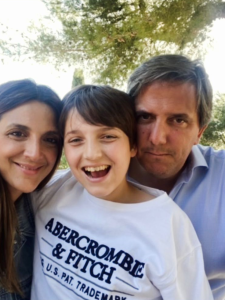Andy
“The typical plan for most parents is to look after their children for about eighteen years. They hope that the children will then return to care for them in the last years of their own lives.
Parents of children with disabilities make a plan to care for their children as long as they live. And another plan for when they are gone.
To understand this is to realise the magnitude of the strength and willpower many of them muster to achieve it.”
Synapsis
Antonia – Andy Tournikioti Karantza is now the Vice President of a successful car leasing company and the mother of three boys. In 2006, Andy and her husband Dimitris were blessed with a beautiful son. During the first few months after Vassilis’ birth, they noticed certain developmental delays and behaviors that made them wonder… After much testing and relentless research, Andy and Dimitris found out that Vassilis has a rare neurogenetic disorder known as Angelman Syndrome.
The syndrome affects 1 in 12,000 to 20,000 births – and there is currently no cure. We asked Andy to share her experience.
“It is hard at first, but there is no time to think, to cry, or even to really come to terms with what has happened. You learn that your child may never talk, may never walk and may never be independent. You start to race against time, running to therapies, doctors and experts until you realise that YOU will always be the expert and no one else. You understand that you will always be the only one who really knows what your child needs, and eventually you will even understand your child’s thoughts. Nothing and no one could ever have prepared you for this. But then there he is, a little boy who looks at you, laughs and hugs you like there is no tomorrow…”.
“Our little boy was waiting for us to help him learn more about the world. Getting Vassilis to take his first steps was a struggle for us, but most of all for him! Not only did the so-called ‘developmental milestones’ come late, but he had to fight to reach them. And then the success, he made it! He now walks, swims, cycles and even almost runs! These very important steps, which we usually take for granted, were celebrated in our family.”
“My life has changed – in a difficult way at first, but then… oh God! Sometimes I hesitate to share this with people because I know they may never understand or even believe me. My message to parents who are blessed with special children like mine would be this: YES, YOU GUYS, WE ARE LUCKY TO HAVE THEM! We are daily rewarded with the best hugs in the world and the purest love. And even the everyday routine gets easier, you get used to going to therapies, you get accustomed to sleeping less and you accept the new rules of life. Apart from the part of always trying to find a school or “day centre” that will accept your child and teach him as much as possible so that he can make the most of his potential, my experience has been good. The people around me have embraced Vassilis, they have accepted him and always offered a helping hand to my family.
“Vassilis is now 17 years old, he has achieved so much more than we were told he would. Parent hubs around the world will always be there to help the newly diagnosed families. Do not ignore them! They are your new family now. The bond between families who share this experience is unimaginable.”
“Our children move on, learn a lot and continue to surprise us in the best possible way. But they are not independent in this tough and demanding world. And they never will be. So you are always faced with the worst thoughts, thoughts you never want to face, but you have to. What happens if something happens to me? What happens when I leave? There are still many societies where minorities remain in the dark, but how we treat the weakest among us is what distinguishes a developed society.”
“We, as a family, have tried to learn everything we can about the Angelman syndrome in order to provide our son with all possible resources. We are always there for him, not only as parents, but also as playmates, educators and therapists. Vassilis loves cooking with his mum and listening to music with his dad, and his brothers are his best friends. However, like any other family, ours needs a lot of support because it is extremely important for Vassilis to have a variety of stimulation in his life. He needs occupational therapy, speech therapy and sports, he has benefited immensely from riding, cooking, being exposed to music, playing outside and in the water. All these activities help a person with a neurological disorder to develop, change, create and gain a sense of self-worth. Vassilis had to work hard for the things we all take for granted. He made us better and stronger people and taught us patience and perseverance”.
“The children like our Vassilis have a good time together, they have fun in their dormitories, they go camping together, they go to special schools, but what happens when they are eighteen years old?” asks Andy, and continues, “We see young people who want to be with the friends they have made since childhood, who want to continue their activities after they have officially become adults, but there is a serious lack of infrastructure and community support.”
“Just as we nurture our children with love and care, we need to continue to care for them as they transition into adulthood. We need the right people, special educators, medical professionals and therapists for people with intellectual disabilities to integrate them into society and make them feel comfortable and protected in their surroundings”.

